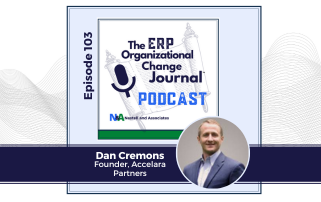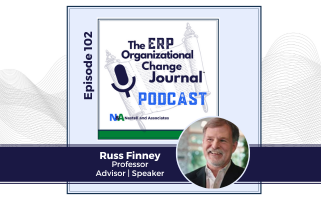ERP organizational change success is not just about the technology and processes, but also about effective and efficient training, knowledge sharing, transfer of knowledge, and education. The role of learning is significant and can help organizations to manage change successfully. So, et’s analyze the importance of learning in ERP organizational change and explore how practitioners can apply learning and development principles.
Article Contents
- What is Organizational Change and Learning?
- ERP Organizational Change Practitioners Wear Many Hats…and Teacher Is One of Them
- Effective Learning is Essential for ERP Organizational Change
- The Role of Learning in Organizational Change
- Tips for Tailoring Training Programs to Different User Groups in ERP Organizational Change
- Addressing Common Challenges in Integrating Learning into ERP Organizational Change Projects
- Anticipating and Mitigating Roadblocks in Integrating Learning into ERP Organizational Change Projects
- The Role of Leadership in Integrating Learning into ERP Organizational Change Projects
What is Organizational Change and Learning?
Organizational change and learning are interrelated concepts that are crucial for the success of any organization. Organizational change refers to the process of implementing new strategies, technologies, or processes within an organization to improve its overall performance. On the other hand, learning refers to the acquisition of knowledge, skills, and behaviors that enhance an individual’s ability to perform a task or role. In the context of organizational change, learning is critical because it enables individuals and teams to adapt to new systems, processes, and ways of working.
As stated by Gartner, “organizational change management is a systematic approach and application of knowledge, tools, and resources to deal with change.” This means that effective organizational change management requires a focus on both the technical aspects of change, such as new technologies or processes, as well as the people aspects of change, such as learning and development. By emphasizing the importance of learning in the context of organizational change, organizations can better manage the challenges and opportunities presented by change, and ultimately achieve their goals and objectives.
Examples of Relevant Research on ERP Organizational Change
- “Several researchers have emphasized the significance of organizational learning in the success of ERP implementations (Scott & Vessey, 2018; Stratman & Roth, 2018).
- Scott and Vessey (2018) noted that despite the well-known issues related to ERP implementations, they remain problematic. They suggested that organizational learning is implicitly and indirectly associated with success.
- Stratman and Roth (2018) identified ERP training and learning as essential elements of ERP competence. They defined ERP training as the process of teaching various user groups to use the system efficiently in their day-to-day activities, and emphasized the importance of ongoing training and review sessions. They also noted that learning activities aim to identify cutting-edge ERP techniques and pilot-test them for delivering business value in day-to-day operations.
- Rouhani and Ravasan (2012) developed an expert system to predict ERP post-implementation success based on organizational profiles. They suggested that training and education of the project team is a crucial dimension and factor in ERP readiness assessment.
- Shao, Feng, and Hu (2017) examined the impacts of exploitative and exploratory learning approaches on ERP assimilation and found that exploitative learning dominates ERP assimilation compared to exploratory learning.
ERP Organizational Change Practitioners Wear Many Hats…and Teacher Is One of Them
As ERP organizational change practitioners, we need to understand that in order to allow technology (ERP) to effectively and efficiently work for business, it requires the right combination of knowledge and management of the triad: people, processes, and technology. And many practitioners have a sound knowledge of ERP technologies and emerging technologies, are experts in ERP system selection, certified project managers (PMPs), have an understanding of project management techniques, tools, tactics, and best practices, and have a level of expertise in business processes and business process re-engineering. They also possess “soft skills”, “people skills”, management skills, and leadership skills required to endorse positive change. However, for these skills to be useful, they have to be effectively taught. That is, knowledge needs to be effectively transferred to the organizational stakeholders. ERP organizational change practitioners are teachers.
Effective Learning is Essential for Successful ERP Organizational Change
ERP organizational change research and practice understand that the ideas around organizational learning can not just simply be understood. And the ideas around the importance of effective and efficient learning need to be actionable, based on principle, and represented as tactical items in an ERP organizational change game plan. Otherwise, the knowledge (if understood) is not being applied. This knowledge could then be underutilized and therefore not effective nor bringing value to the organizational change effort. The value of ERP organizational learning and education of stakeholders in a way that best transfers training and knowledge to “the floor” is invaluable. Not acting upon the value of sound learning knowledge and principles is merely treating “learning” as a buzzword. Or, in other words, it’s “all bark and no bite”, “all talk and no walk”, “all sizzle and no steak”….
ERP organizational change professionals are indeed teachers. Because they not only need to understand sound learning and development principles but these principles need to be soundly acted upon. Effective and efficient stakeholder learning and education have a significant impact on ERP organizational change success.

ERP organizational change project plans benefit from approaching change with increased awareness and application of learning and development techniques and principles.
The Role of Learning in Organizational Change
The role of learning has a significant place in ERP organizational change success. As much as the other two components of the ERP organizational change triad (technology and process), organizational and individual learning, effective and efficient training, knowledge sharing, transfer of knowledge, and education are crucial to the success of ERP organizational change project plans. Therefore, perhaps ERP organizational change project plans would benefit from approaching change with increased awareness and application of learning and development techniques and principles that best advocate for organizational learning, and therefore ERP organizational change success.
“Although education is a cornerstone of ERP implementation, the user training is usually only emphasized, and the courses are centered on computer/system operation rather than on understanding the ERP concept and spirit.” (Yu,2013)
The Significance of Learning in Organizational Change
What does vendor-neutral and objective research tell us? Much extant work would suggest that as ERP organizational change practitioners, we would benefit from exploring and applying key ideas derived from Learning and Development research and practice. After all, “organizational learning” essentially represents the holistic accumulation of individual human learning. “The strength of the team is each individual member. The strength of each member is the team.” –Phil Jackson
This notion of the role of effective learning is supported by a great deal of sound research in the field of ERP organizational change. Additionally, a plethora of studies has shown that effective learning is essential for the success of ERP organizational change projects. For instance, a study by Sabherwal et al. (2001) found that learning is a critical factor in the success of ERP implementation. Similarly, in their study, Gunasekaran and Ngai (2004) also found that training and education are important factors that contribute to ERP success.
Examples of successful ERP organizational change projects that benefited from learning and development principles:
- Company A was a manufacturing firm that decided to implement a new ERP system to improve efficiency and accuracy. They developed a comprehensive training program for all employees, including hands-on simulations and online courses. The training helped employees understand how to use the new system and its benefits, which resulted in a smooth transition and increased productivity. The company also provided ongoing training to ensure employees continued to use the system effectively.
- Company B was a financial services firm that underwent a major merger and acquisition. As part of the integration process, they decided to implement a new ERP system to streamline their operations. The company invested in a robust change management program that included employee training and development. The program helped employees understand the rationale behind the changes and how to use the new system effectively. This led to a successful integration and improved business outcomes for the company.
Tips for Tailoring Training Programs to Different User Groups in ERP Organizational Change
To implement effective and efficient training, knowledge sharing, transfer of knowledge, and education in ERP organizational change projects, the following tips can be helpful:
- Tailor training programs to different user groups: Different user groups have different needs and learning styles. For example, end-users may need more hands-on training while executives may prefer high-level overviews. Therefore, it is important to tailor training programs to meet the specific needs of each user group.
- Evaluate the effectiveness of training: It is important to evaluate the effectiveness of training programs to ensure that they are achieving their intended goals. One way to evaluate the effectiveness of training is to measure the level of knowledge and skills that users have gained. Another way is to measure the impact of training on business outcomes such as productivity, efficiency, and profitability.
- Provide ongoing support: Effective training is not a one-time event. It requires ongoing support and reinforcement to ensure that users are able to apply their newly acquired knowledge and skills. This can include providing access to additional resources, such as job aids and manuals, as well as ongoing coaching and feedback.
- Foster knowledge sharing: Knowledge sharing is essential for successful ERP organizational change. It is important to create an environment where users feel comfortable sharing their knowledge and experiences with others. This can include creating communities of practice, hosting knowledge-sharing sessions, and recognizing and rewarding knowledge-sharing behaviors.
Addressing Common Challenges in Integrating Learning into ERP Organizational Change Projects.
Acknowledge that integrating learning into ERP organizational change projects is not always a smooth process. Common challenges that organizations may face include:
- Resistance to change
- Lack of buy-in from stakeholders
- Difficulties in measuring the effectiveness of learning initiatives
- Limited resources and budget for training and development initiatives
- Difficulty in aligning learning objectives with overall ERP implementation goals
Anticipating and Mitigating Roadblocks in Integrating Learning into ERP Organizational Change Projects
Anticipating and mitigating potential roadblocks is a crucial step in successfully integrating learning into ERP organizational change projects. Here are some tips for addressing common challenges:
- Resistance to change: Resistance to change is a common obstacle to successful ERP implementation. To address this, it is important to communicate the benefits of the change and involve stakeholders early in the process. Engage with them to understand their concerns and involve them in decision-making as much as possible.
- Lack of buy-in from stakeholders: Similar to resistance to change, lack of buy-in from stakeholders can also be a barrier to successful ERP implementation. It is important to involve stakeholders in the planning and implementation process to increase their ownership and investment in the project. Communication, collaboration, and transparency are key to ensuring buy-in from stakeholders.
- Difficulties in measuring the effectiveness of learning initiatives: Measuring the effectiveness of learning initiatives can be challenging, but it is essential to track progress and adjust strategies as needed. Consider using a variety of methods, such as surveys, assessments, and feedback sessions to gather data on the effectiveness of the learning initiatives.
- Limited resources and budget for training and development initiatives: Limited resources and budget can be a major obstacle in implementing effective training and development initiatives. To mitigate this challenge, organizations can prioritize training initiatives based on the most critical needs, leverage existing resources and technologies, and seek out external support or partnerships.
- Difficulty in aligning learning objectives with overall ERP implementation goals: Alignment of learning objectives with overall ERP implementation goals can be difficult, but it is essential to ensure that learning initiatives support the broader goals of the project. Ensure that the learning objectives are clearly defined and align with the broader objectives of the ERP implementation. Consider involving key stakeholders in the development of learning objectives to ensure alignment.
The Role of Leadership in Integrating Learning into ERP Organizational Change Projects
Leadership plays a critical role in facilitating effective learning in ERP organizational change projects. And leaders can create a culture of learning by modeling desired behaviors, promoting collaboration and knowledge sharing, and providing resources to support learning initiatives. So, it is essential for leaders to communicate the value of learning and emphasize the role it plays in achieving organizational goals. Additionally, leaders should be actively involved in the learning process by participating in training programs, providing feedback and coaching to employees, and recognizing and rewarding learning achievements.
Conclusion
Effective and efficient learning, training, and education are crucial components of ERP organizational change success. The role of learning in managing change and implementing ERP systems is significant, and practitioners need to apply sound learning and development principles to transfer knowledge to organizational stakeholders. With the right combination of knowledge and management of people, processes, and technology, ERP organizational change practitioners can effectively teach and lead their organizations to successful ERP implementation.
Unlock the Potential of Your ERP Organizational Change Projects!
The key lies in effectively incorporating learning and development principles to foster a culture of growth and knowledge sharing. Get in touch with Nestell & Associates today and let our expert team guide you through the process of integrating effective learning strategies into your ERP organizational change initiatives. Together, we can achieve lasting, meaningful change that drives growth and success for your organization.
Dr. Jack G. Nestell
Latest from the Blog
“Why Machines Will Never Rule the World”-Exploring the Future of Artificial Intelligence with Dr. Jobst Landgrebe & Dr. Barry Smith
This article explores the potential and limitations of artificial intelligence, examining how far AI might go in shaping our future. Based on insights from Jobst Landgrebe and Barry Smith's book, Why Machines Will Never Rule the World: Artificial Intelligence without...
Artificial Intelligence Research: What Do 85 Peer-reviewed Articles Say about AI in Information Systems?
This article presents an in-depth analysis based on Dr. Ofosu-Ampong's review of 85 peer-reviewed articles, exploring the current state and future directions of Artificial Intelligence (AI) research within Information Systems. Highlighting the key themes such as...
Bias in Artificial Intelligence-Enabled ERP Software Customization: Say whaaat?!
Uncover the nuances of bias in AI-enabled ERP customization, presenting both the unseen challenges and potential strategies for improvement. The article offers insights into the critical yet often overlooked issue of algorithmic bias, referencing recent research to...
Latest Episodes
Human Capital in PE-Backed Companies: Strategies for Leadership and Talent Management
Human Capital in PE-Backed Companies: Strategies for Leadership and Talent ManagementEpisode Overview - PE-backed Human Capital Strategies Today’s episode centers on the pivotal role of human capital in PE-backed companies, emphasizing how strategic leadership and...
ERP Organizational Change: Technology Strategy
ERP Organizational Change: Technology Strategy and Keys to SuccessEpisode Overview - Technology Strategy In general, at the highest level of categorization, there seems to be consensus on the importance of people and culture, informational technology, and project...
AI and Private Equity Synergy: Fueling Business Transformation
AI and Private Equity Synergy: Fueling Business TransformationEpisode Overview - AI in PE Strategies In this episode, we explore how AI and Private Equity synergies are fueling business transformations and reshaping investment strategies and operational efficiencies....
Article References
Yu, Y. (2013). Implementation of ERP Systems: Accounting for Learning Curve and Application Evolution. International Journal of Accounting and Financial Reporting, 3(2), 209-222.
Gunasekaran, A., & Ngai, E. W. (2004). The successful management of a small logistics company’s ERP implementation: a case study. Journal of Enterprise Information Management, 17(3), 146-154.
Rouhani, S., & Ravasan, A. Z. (2012). Expert system for predicting ERP post-implementation success based on organizational profiles. Journal of Enterprise Information Management, 25(2), 174-197.
Sabherwal, R., & Chan, Y. E. (2001). Alignment between business and IS strategies: a study of prospectors, analyzers, and defenders. Information systems research, 12(1), 11-33.
Scott, J. E., & Vessey, I. (2018). When enterprise resource planning systems fail, why do managers continue to use them? Journal of Information Technology, 33(1), 55-72.
Shao, Z., Feng, Y., & Hu, Q. (2017). Exploring the impact of exploitative and exploratory learning approaches on enterprise resource planning (ERP) assimilation. Information & Management, 54(3), 354-365.
Stratman, J. K., & Roth, A. V. (2018). Learning to manage ERPs. Journal of Operations Management, 65(8), 679-694.







